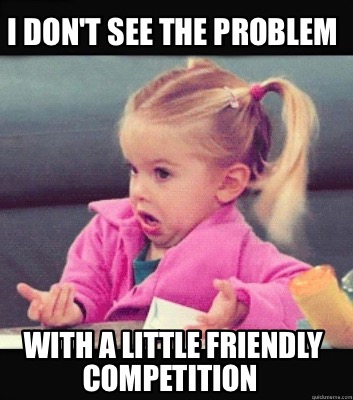Beckett loved sports, and he was good at it. That is to say that he was a good sport. He didn't play many himself, but he loved to applaud the achievements of others. He didn't only celebrate his own team's victories, but cheered for everyone else to play well also.
"Nice shot!" He would exclaim for a buzzer beater three pointer by the opposing team.
"Why are you cheering for them?" His friends would complain.
"I call 'em like I see 'em," he would reply diplomatically with an indifferent shrug of his shoulders.
Of course cheering for opponents and underdogs came to an abrupt halt the instant anyone was beating his team. Not only in a game, but in the polls. If a team was ranked better than his team, he wanted them to slip just a little so that he could move back up to the top, back into his comfort zone, where nothing could threaten his standing and he could afford to be magnanimous once again.
He was a good friend in the same way, cheerful and affable, always reliable to be there for you when you needed a hand, generous almost to a fault. You could easily count on him 98% of the time. And because anything above 93% earns an A, who could complain about that?
And that other 2%? He was never a bad friend, exactly, at least not in any way you could clearly point out and make him look bad. It's just that he could feel a bit insecure at times, and if you happened to be a little better looking or more interesting or successful, well, that left him with two options.
The first option was to compete and catch up. He worked hard, which won him many successes and accolades. He found various ways to become more interesting and set himself apart from the crowd.
He took up hunting, and decorated his high-ceilinged living room with trophies of "the big five." One plaque remained empty, however, and when anyone commented on it, it gave him the opportunity to humbly and magnanimously repeat the story of the one that got away, proving how comfortable he felt in being a regular mortal like the rest of us.
Truth be told, he probably had that mild insecurity to thank for the majority of his drive and half the successes in his life, so how bad could it be? In fact, could you accurately judge it as bad at all? Nobody's perfect, after all, and maybe insecurity, which in his case so often played out like humility and other admirable virtues, is one of the best imperfections to have.
The second option was much easier than hard work, and it came even more naturally to Beckett. When you analyze it logically, it even makes more sense. If you wanted a house with a better view, would you be wiser to go to all the trouble of moving, or set hydraulic jacks under your house and raise it up a few feet, or simply chop down the trees blocking the vista?
So whenever Beckett found himself near anyone who triggered his sense of insecurity, who was perhaps a bit taller or better looking, or more interesting or successful, whether friend or opponent, why not jokingly point out that one minor flaw, or cheerfully relive that one time they did something stupid, or draw attention to some other area where Beckett excelled, as long as that made him feel a bit better, and no one was ever really injured.
You may be thinking that Beckett had a third option for comportment in such circumstances, but you would be wrong. You may argue that he would have been wise to choose to address his true enemy instead, to face and vanquish his insecurity once and for all. But choice requires awareness, and because it never occurred to Beckett to do so, he was never free to make such a choice.
Beckett's life may have continued thus indefinitely, and perhaps he would eventually have grown aware of the third option and chosen to exercise it, had not his best friend and top competitor (secret competitor, that is - he would never admit it, even to himself) won a large promotion at work.
In order to reset the scales in his favor, Beckett requested two weeks of leave and flew to Africa to complete his trophy room.
He awoke on the third morning of his safari and sat up in bed, yawned, then turned and set his feet on the dirt floor of the tent, which happened to be where a king snake had slithered in overnight to rest in the relative warmth.
He hadn't yet fully woken up or recovered from the shock of the snake bite when he found himself standing, rather dazed, at the Pearly Gates.
"You suck," said St. Peter with a disapproving shake of his head, "but come on in."


I like how I add random details to illustrate some point, then those details drive major plot elements later in the story as the ending reveals itself.
cytotec buy online – where to buy diltiazem without a prescription purchase diltiazem